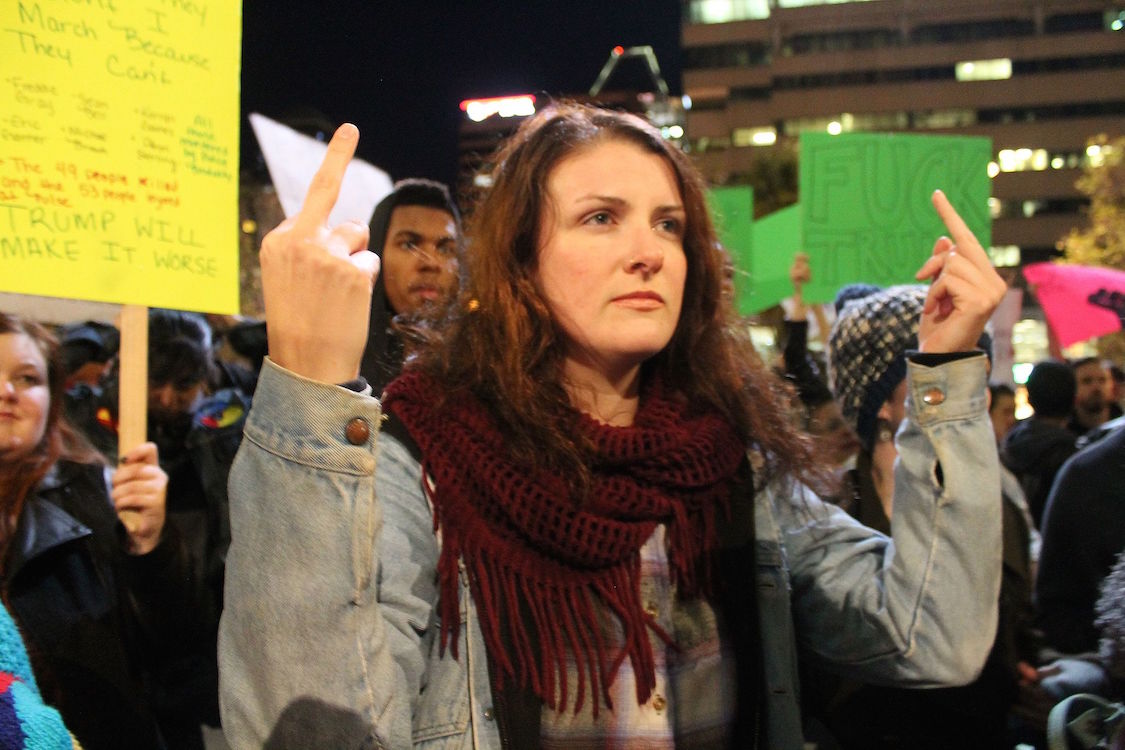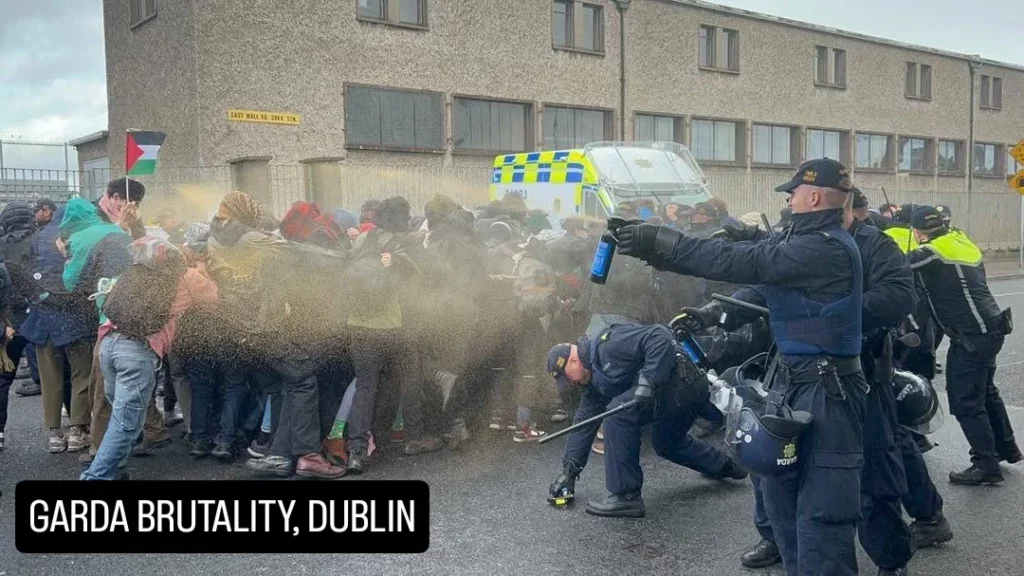Mia Craven
At 4:03am on September 27, László Molnárfi sent me a link to the Wikipedia page for ‘Dirtbag leftism’ along with the following message: “I just realized that this is an actual thing and not a term you made up. You have no idea how happy I am to have found this. This is exactly what I have been looking for. I will bring this sort of politics to Ireland.”
I, being a self-described dirtbag leftist who feels quite placeless in the mainstream Irish Left, was pleased with Molnárfi’s pledge. I was hopeful, especially upon witnessing the positive response to his article, ‘We Should All Be Dirtbag Leftists’, published in Trinity News. Perhaps the tide was turning in the Irish left, I thought; it was ripe time dirtbag leftism was picked up by someone who might be arsed to make something of it. Molnárfi, in harnessing far more vitality, joie de vivre, and Führer-esque attributes than I, seemed the perfect fit for the job.
But I worry this man, whom The Burkean has since taken to fondly calling a Nazbol, is late to the party. Until very recently, he was completely entrenched in woke liberal ideology. The home page of the Students4Change website, an organisation which he spearheaded, still reads: “[We are] a collective of socialist students, who work actively to dismantle the corporate university, as well as the racist, imperialist, white supremacist, patriarchal and cisheteronormative systems it reflects and reproduces”. His pronouns remain plastered all over his social media profiles. In 2023 he worked to deplatform Mohammed Hijab, who had been scheduled to speak at Trinity. A little over two years ago, Molnárfi was perpetuating the same cancel culture he now denounces, as he professes the gospel according to Mark Fisher.
I do not intend to slam Molnárfi’s character or to suggest we flagellate him for his past thought crimes. He has since reformed his thinking – that is what matters. But we must be conscious of the fledgling quality of the more “reactionary” aspects of his thought as he begins this new iteration of his prolonged attempt to change the agenda of the Irish left and to reinstate a class-first politics. Moving with all the zeal and blind devotion of a newly converted traditional Catholic – the kind that kneels down before the priest and sticks their tongue out to receive communion, much to the dismay of their fellow, more seasoned, churchgoers – he perhaps overlooks that, for those of us who have been around the block so to speak, dirtbag leftism is defunct – at least in the United States, where it has been tried and failed. His enthusiasm, admirable as it is, exists because it is not filtered by memories of a bygone era of Chapo Trap House, Red Scare, Dimes Square – good old-fashioned, irony-poisoned Bernie bros.
Put simply, what once seemed to be a fresh, exciting new way of doing left politics in the US has since devolved into a schtick. The dirtbag left rose in popularity during the leadup to the 2016 presidential election, at a time when anti-establishment politics began to take centre-stage. The primaries saw Donald Trump and Bernie Sanders advance different genres of populism; Politico dubbed Trump and Sanders the “yin and yang of America’s political discontent” at the time. Sanders ultimately dropped out of the 2016 election after Hilary Clinton exceeded him in popularity among Democrats. But, for a while, some semblance of hope remained amongst the proponents of this new style of left populism; perhaps owing in part to emails released by WikiLeaks, which showed that, in contradiction with the Democratic National Convention leadership’s publicly stated neutrality, several DNC operatives actively worked against Sanders, deriding his campaign and discussing ways to advance Clinton’s nomination.
But this hope eventually dissipated, especially in the wake of Sanders’ repeated failure to secure the Democratic nomination in 2020. A sense of nihilistic despair set in, and the dirtbag leftist crowd began to advance style over substance, as any hope of advancing substantial, meaningful politics had been lost.
The dirtbag left has since floundered in popularity; as capitalist realism set in, they were left with nothing new to say. All they could do was hurl tired insults at Biden and at Trump. Many pundits turned to the right, proving their preference for style in this new, disillusioning age. Amber A’Lee Frost, who coined the term dirtbag leftism, wrote in her 2016 essay “The Necessity of Political Vulgarity” that Trump’s “vulgarity is appealing precisely because it exposes political truths”. She suggested the left adopt similar tactics. But, in adopting such tactics, the lines between the left and right began to blur for some. The right’s anti-establishment rhetoric, edgy aesthetics, and perhaps crucially their electoral success, were evidently a draw for some dirtbag leftists, who perhaps valued their anti-woke social politics over the class-first politics dirtbag leftism was initially supposed to centre. The Red Scare girls, for example, had Curtis Yarvin on the podcast in 2022, and most recently hosted Nick Fuentes in October 2025. Dimes Square microcelebrity Honor Levy has also cosied up with the New Right, including, again, Curtis Yarvin.
Andrew Marantz professed the end of the dirtbag left in 2021, and postulated that a more erudite, sincere, “dorkbag left”, as exemplified by the Know Your Enemy podcast, would supersede it. His former observation has proven true; his latter prediction has since been proven false. The uncool, woke, politically correct style of so-called “leftism” has prevailed. This style of doing politics is uninspiring, and distracts from the main goal of socialist politics, which is economic upheaval. Molnárfi is right in identifying a gap in the left ideological market; dirtbag leftism, while a failed project in the US, could certainly be tried elsewhere – in his case, in the Irish context.
I suggest he, and all sympathisers with the dirtbag left of politics, take two main lessons from the Americans’ failed project. First, the need for electoral representation of left-wing, unapologetically class-first populism is palpable. Momentum and drive is lost when liberal respectability and neoliberal economics prevails. Second, leftists must not lose sight of what is important: class and socialist economics. Dirtbag leftism, while vulgar, is vulgar for the sake of rejecting the woke left’s extreme focus on identity politics. Identity politics is rejected because it can serve, as is in the case now in PBP, as a divisive distraction from the main goal of leftist politics. Dirtbag leftists should not actively work against identity politics and championing minorities’ rights. The point is that a mass left wing movement cannot be built and sustained by focusing on these issues alone, and that making shitty jokes should not be a cancellable offense. Dirtbag leftists will be tempted by the right. But we cannot forget why the style of dirtbag leftism became so popular in the first place; it recognised that economics, not identity, is what socialist politics hinged on. The right actively works against minorities, and advances discriminatory economic policies. Enchanting and effective as their aesthetics and rhetoric may be, they are just that: aesthetics and rhetoric. The Irish dirtbag left, if it emerges successfully, must remember the very principles their leftism was founded on, why they were drawn to dirtbag leftism in the first place.
The left can take advantage of aesthetics and rhetoric, too. “The left cannot meme” is an observation, not a tautology. In fact, the left must improve its employment of libidinal elements if it wishes to succeed in a political landscape of mass disenchantment – this disenchantment being evinced by the record 12.9% of spoiled ballots in the recently held presidential election. But aesthetics are ultimately a means to an end, not an end in themselves. If the Irish left can appreciate this fact, perhaps dirtbag leftism’s failures abroad might yet be its salvation here.





Woke is the only game in town, sorry. This “dirtbag left” stuff was never actually popular, it was like three and a half podcasts and a few hundred socially awkward Men on twitter. It was stupid in 2016 and it’s utterly tragic to try to keep it going now.